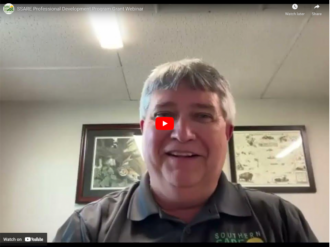GRIFFIN, Georgia – The Southern Sustainable Agriculture Research and Education (SSARE) program held a free webinar on August 16 for agricultural professionals such as Cooperative Extension; NRCS; Farm Service Agency, or other USDA agency staff; agriculture consultants; non-governmental organizations; mentor farmers; and other agriculture professionals interested in learning more about and applying for the Professional Development Program (PDP) grants.
David Redhage, the SSARE PDP Grants Manager, provided guidance to potential applicants on preparing a competitive pre-proposal when applying for the PDP grant. The webinar recording is available on the SSARE YouTube channel and was free with registration.
Topics discussed:
1. About Southern SARE and our outreach staff
2. An overview of the Southern SARE Professional Development Program (PDP) grant
3. Eligibility criteria and funding amounts
4. Timeline for pre-proposals and full proposals
5. Guidelines for submission, including a focus on a train-the-trainer approach
6. Non-fundable items (e.g. infrastructure, equipment)
7. Common reasons for proposal rejection
8. Examples of previously funded projects
9. Importance of contacting potential partners (e.g. extension, NRCS) early
10. Possibility of multi-state projects
11. Definition of farmers in the context of this grant
12. Application process and deadline considerations
Redhage shared that the current pre-proposal call, focused on training-the-trainer education in sustainable agriculture, is currently open and closes on August 30th. These grants are typically around $80,000 but can be higher with strong justification. Projects should address the three pillars of sustainability: environmental, social, and economic impacts, but research is not funded through this program.
Southeastern Outreach Coordinator Brennan Washington shared additional information including that applicants do not need a farm and track number to apply and Communication Specialist DaraMonifah Cooper responded to questions from attendees about the application process and eligibility.
Applicants are encouraged to view the Call for Pre-Proposals and submit early, prior to the deadline, to avoid technical or other challenges that may delay or prevent submission. The deadline to submit a Pre-proposal is August 30, 2024 at 12 p.m. EST (NOON).
Pre-proposal applicants who are invited to submit a full proposal will be notified by email by October 2024. The deadline to submit a full proposal is November 15, 2024, and full proposals will be awarded in February 2025. Research projects and farmer-outreach or education projects do not qualify for this funding.
To learn more about this grant opportunity in the Southern region an overview of the PDP program is available on the PDP grant webpage. For more information contact David Redhage at dredhage@kerrcenter.com or call (918) 647-9123, ext 220 or SSARE PDP Program Assistant Madalyn Templeton at mtempleton@kerrcenter.com or (918) 647-9123, ext 218.
RELATED LINKS
· Webinar Recording: https://youtu.be/glf7XSuCE_w
· Presentation Slides (also attached as a PDF): https://www.scribd.com/document/759667489/2024-PDP-Grant-Zoom-Webinar-Slides
· Professional Development Program Grants Webpage: https://southern.sare.org/grants/apply-for-a-grant/professional-development-program-grants/
· Call for Pre-Proposals: https://www.sare.org/wp-content/uploads/2025-Southern-SARE-PDP-CFPre-Proposals.pdf
· Link to Apply: https://projects.sare.org
Published by the Southern Region of the Sustainable Agriculture Research and Education (SARE) program. Funded by the USDA National Institute of Food and Agriculture (NIFA), Southern SARE operates under cooperative agreements with the University of Georgia, Fort Valley State University, and the Kerr Center for Sustainable Agriculture to offer competitive grants to advance sustainable agriculture in America’s Southern region. This material is based upon work that is supported by the National Institute of Food and Agriculture, U.S. Department of Agriculture, through Southern Sustainable Agriculture Research and Education. USDA is an equal opportunity employer and service provider. Any opinions, findings, conclusions, or recommendations expressed in this publication are those of the author(s) and do not necessarily reflect the view of the U.S. Department of Agriculture.
